Qyral Review: Prescription hair care, skincare & weight loss
![]() Qyral fails to provide clear ownership or executive information on its website.
Qyral fails to provide clear ownership or executive information on its website.
Founder and CEO Hanieh Sigari is mentioned in Qyral blog posts and a “story” page, but you have to get lucky and stumble across a blog post with that information.
And even then it’s not particularly clear who Sigari is or her role within the company.
Over on Qyral’s YouTube channel Sigari is readily cited, so I’m not sure why this information is withheld on Qyral’s website.
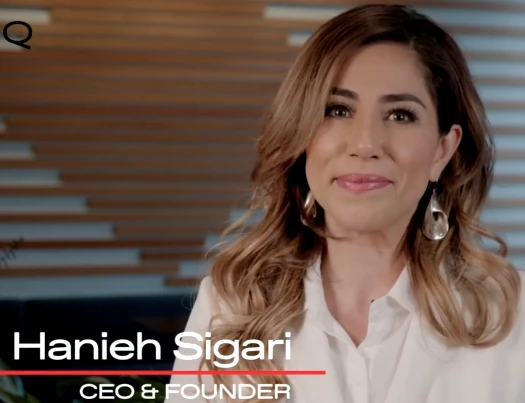
Sigari doesn’t appear to have an MLM history. There are numerous published marketing articles and “interviews” on Sigari, in which most of them Sigari references a healthcare and ecommerce business.
Here’s a typical example from a 2020 puff-piece in Buzz Magazine;
I founded a home healthcare business that enabled dementia and Alzheimer’s patients to retain their independence, while [Sigari’s husband] entered e-commerce logistics.
Both companies thrived — mine enjoyed 600 percent YoY growth and employed hundreds of staff, while his grew to a $20M brand with four international locations.
Despite boasting of previous success, Sigari is careful not to mention any former company names in any of the published marketing material. This is a bit suspicious.
I don’t know what Sigari’s former business was called but the cited ecommerce business is Simple Global.
 In Sigari’s husband Darius Banasik’s own words;
In Sigari’s husband Darius Banasik’s own words;
I co-founded Simple Global, Inc. in 2012 as an ecommerce fulfillment provider, and over seven years my team and I led its evolution into a vertically integrated, cloud-based global logistics platform, focusing on international expansion and our SaaS platform’s user experience.
We effectively got ecommerce brands to “go global” in 20 minutes!
After Simple Global there was EcomBLVD, an ecommerce middleman platform.
Whatever Sigari’s former healthcare business was, she went on to launch Qyral in 2020. Banasik signed on as Qyral’s Executive Chair.
Update 18th March 2024 – Just a note on Qyral’s launch, Sigari was discussing Qyral in marketing articles dated December 2019. The first Qyral website blog post is dated January 2nd, 2018.
Qyral’s official FaceBook page was created on September 29th, 2019. This is probably around the time Qyral actually launched. /end update
Both Sigari and Qyral are based out of California in the US.
Read on for a full review of Qyral’s MLM opportunity.
Qyral’s Products
Qyral markets a range of prescription hair care, skincare and weight loss products.
Hair Care
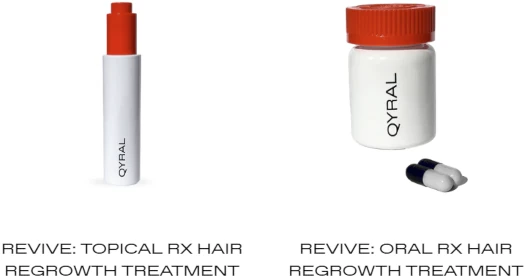
Qyral markets its haircare range as “hair loss medications” that are “targeted solutions to support your hair journey”.
- Revive: Topical RX Hair Regrowth Treatment – “prescription, personalized formulation that addresses the underlying causes of hair loss”, retails at $99 a bottle plus a $50 doctor consultation fee
- Revive: Oral RX Hair Regrowth Treatment – capsule version of Revive topical, retails at $84 a bottle plus a $50 doctor consultation fee
Qyral’s hair care product pages suggest its hair care range lasts up to six weeks per bottle.
Skincare
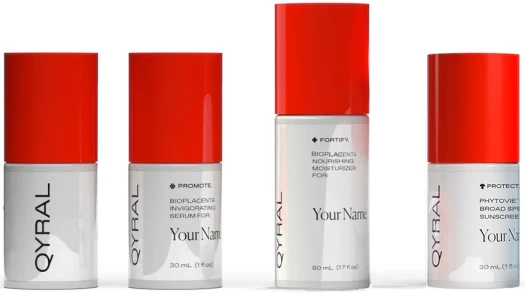
Qyral markets its prescription skincare range to consumers who which to address aging, hyperpigmentation, rosacea, acne and psoriasis.
Four skincare product categories are sold, with a purported 143 possible ingredients used to produce a customized formula.
- Accelerate+ – “prescription ingredients in a personalized compound to address the underlying causes of premature aging”, retails at $84 a bottle plus a $50 doctor consultation fee
- Vanish – “contains a cutting-edge combination of prescription ingredients designed to tackle the causes of hyperpigmentation at source”, retails at $84 a bottle plus a $50 doctor consultation fee
- Clear – “break free of breakouts with a prescription formulation designed to tackle acne with a customized formulation designed just for you”, retails at $84 a bottle plus a $50 doctor consultation fee
- Calm – “prescription-strength cream uniquely formulated to relieve redness and soothe irritation associated with rosacea”, retails at $84 a bottle plus a $50 doctor consultation fee
- Soothe – “tackle the symptoms of psoriasis with a prescription formulation customized to address your specific needs”, retails at $84 a bottle plus a $50 doctor consultation fee
- Accelerate – “cellular revitalizing serum (that) may increase your skin’s sensitivity to the sun and particularly the possibility of sunburn”, retails at $74 a bottle
- Fortify – “a rich yet lightweight formula that hydrates, moisturizes, conditions and nourishes throughout the day”, retails at $79 a bottle
- Promote – “supports cellular processes, increases cell regeneration, and promotes the production of collagen”, retails at $84 a bottle
- Sustain – “daily dietary supplement designed to support your skin and body’s functions”, retails at $64 a tub
- Protect – “mineral primer that delivers an even finish and flawless coverage so makeup looks fresh all day long”, retails at $49 a bottle
- Clarify – “concentrated cleanser that delivers gentle yet effective results, leaving skin feeling luxuriantly fresh and clean”, retails at $42 a bottle
Qyral’s product pages suggest its skincare range lasts up to six weeks per bottle.
Weight loss
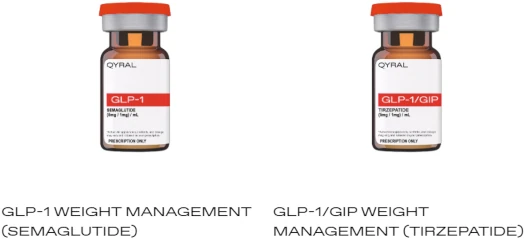
Qyral markets its weight loss products as “weight management medications … subject to approval by a provider on the Qyral platform”.
- GLP-1 Weight Management (semaglutide) – “personalized prescription appetite suppression, side effects may include nausea, diarrhea, vomiting, constipation, abdominal pain”, retails at $349 to $449 for a monthly supply (weekly injection) plus a $90 initial consultation fee
- GLP-1 GIP Weight Management (tirzepatide) – “personalized prescription appetite suppression, side effects may include nausea, diarrhea, decreased appetite, vomiting, constipation, indigestion, abdominal pain”, retails at $499 to $899 for a monthly supply (weekly injection) plus an initial $90 consultation fee
Qyral’s Compensation Plan
Qyral’s compensation plan combines sliding volume retail commissions with two-level deep residual commissions.
Affiliate Ranks
There are four affiliate ranks within Qyral’s compensation plan.
Along with their respective qualification criteria, they are as follows:
- Consulting Partner – sign up as a Qyral affiliate and generate and maintain $300 in PV a month
- Consulting Partner I – maintain $300 PV a month and generate $1000 in personally recruited downline GV a month
- Consulting Partner II – maintain $300 PV a month and generate $2000 in personally recruited downline GV a month
- Consulting Partner III – maintain $300 PV a month and generate $4000 in personally recruited downline GV a month
Retail Commissions
Qyral pays commissions sales volume generated by retail customer orders.
Retail commissions are paid up to 40% of generated retail sales volume, based on a monthly sliding scale:
- generate up to $499.99 in monthly retail order volume and receive a 25% retail commission rate
- generate $500 to $999.99 in monthly retail order volume and receive a 30% retail commission rate
- generate $1000 to $4999.99 in monthly retail order volume and receive a 35% retail commission rate
- generate $5000 or more in monthly retail order volume and receive a 40% retail commission rate
Residual Commissions
Qyral pays residual commissions down two levels of recruitment (unilevel):
- Consulting Partners earn 5% on level 1 (personally recruited affiliate volume)
- Consulting Partner Is earn 7% on level 1
- Consulting Partner IIs earn 8% on level 1 and 2% on level 2
- Consulting Partner IIIs earn 10% on level 1 and 4% on level 2
Joining Qyral
Qyral affiliate membership is $79 and then $8 a month.
Qyral Conclusion
Qyral seeks to combine prescription products with an MLM compensation plan – and I don’t think that’s a particularly good idea.
Typically when it comes to prescription medicine patients are going to a doctor and receiving prescriptions as part of treatment.
When you “MLM” that process, you’ve now got medicine being marketed in search of a problem – more than likely by individuals with no medical training.
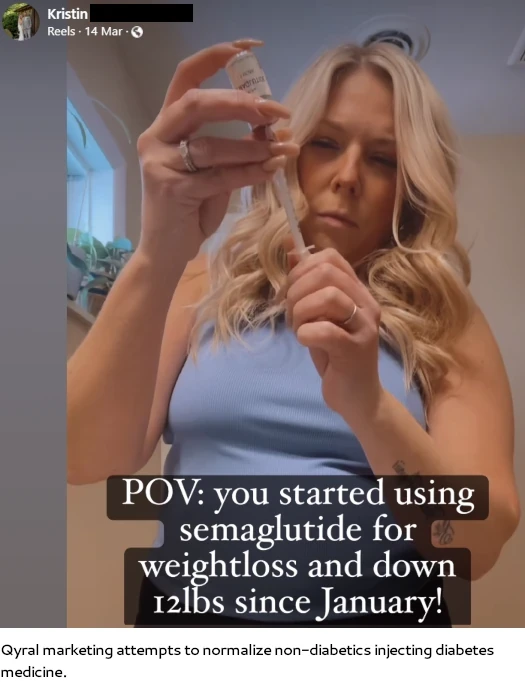
Another problem I see is frontloading Qyral’s products with a doctor’s consult. You pay for both together, which kind of insinuates a guaranteed prescription.
Given there’s no medical diagnosis prior to payment of both product and a telehealth consultation, on what basis is the pre-payment initiated?
Again we’re back to the issue of non-medical professionals marketing prescription medicine.
I ran a simple FaceBook search for “qyral” and every post (until I got bored of scrolling) pertained to their weight loss products. That seems to be the focus of the company.
Launched last year, Qyral offers weight loss customers a choice between semaglutide and tirzepatide.
You probably know semaglutide as Ozempic, Wegovy or Rybelsus. Tirzepatide is is marketed as Mounjaro and Zepbound.
Both are life-changing diabetes medications that lazy people have hijacked for weight loss. In some regions this has resulted in chronic shortages.
There’s not much point beating around the bush here: a weekly injection isn’t a substitute for a lack of exercise and poor diet.

And long-term at up to $899 a month, what’s the plan here? We’re not exactly talking chump change:
The total cost of 72 weeks of tirzepatide treatment was estimated to be about $17,500 compared to $22,800 for 68 weeks of semaglutide.
Overall, the cost to treat each 1% reduction of body weight was $985 with tirzepatide and $1845 with semaglutide.
And then there’s the very real side-effects;
Stomach side effects like nausea, vomiting, and diarrhea are most common for both tirzepatide and semaglutide and can occur in over 50% of all patients.
To their credit, Qyral allow customers to post both positive and negative product reviews on their website. Some of the reviews detail the non-trivial side effects above.
The bottom line? Unless you make an actual change to your lifestyle and diet, the second you come off these medications your weight will return to what it was.
But people are lazy and I suppose that’s the marketing angle Qyral are counting on affiliates to exploit. The question is whether the model is sustainable as an MLM business.
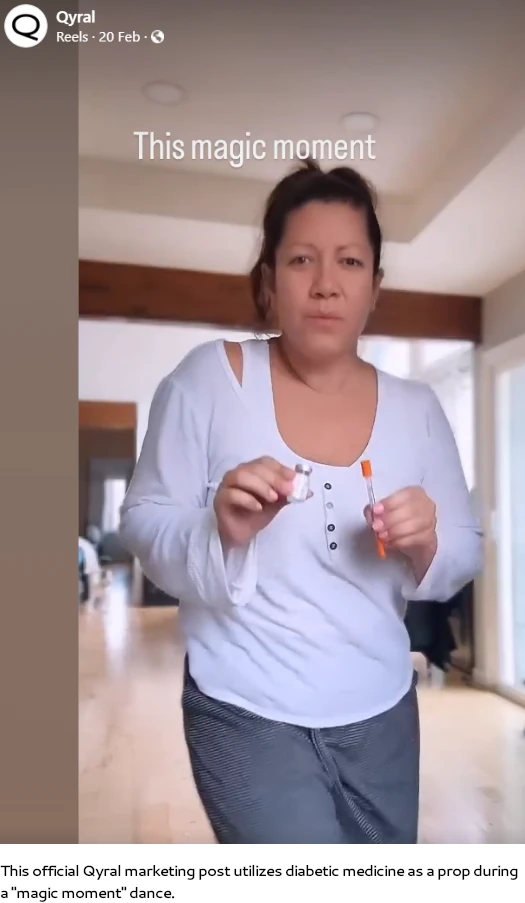
If you’re OK with exploiting a person’s vulnerabilities, such to the extent they’re willing to fork out up to $899 a month for a temporary gain, maybe Qyral is for you.
With idiotic celebrities jumping on the Ozempic marketing machine last year though, competition is fierce.
Assuming availability, Drugs.com pegs a 72/68 week treatment of tirzepatide and semaglutide at $17,500 and $22,,800 respectively.
Qyral comes to $6282 to $8082 for semaglutide and $8483 to $15,283 for tirzepatide. Definitely check local pricing but going on those numbers alone, Qyral seems competitive.
Something else to factor in is consultation charges. Qyral charges $50/$90 upfront for a single consultation (I don’t know if that includes the prescription).
As to the process, this is from Qyral’s website FAQ;
Qyral collaborates with a network of telehealth physicians that has developed an online medical telehealth portal. You will complete a medical history questionnaire.
The telehealth physician will then review your information. If necessary, your provider will communicate with you synchronously or asynchronously — via direct communication, video calls, or phone calls.
Once your provider has all necessary information to evaluate your case, you may be prescribed medication, as appropriate.
If you ever wish to speak directly with your physician, you can contact them via the telehealth portal at any time and request a conversation.
Qyral advises a hair care and skincare consult fee is good for a year, so long as a product subscription is maintained.
Costs beyond the initial $90 consult fee for weight loss aren’t disclosed. If you don’t get a prescription, your product fee is refunded but you’re out the consult fee.
Not unreasonable but if you’re up for spending hundreds of dollars a month, chances are you might have insurance to cover the initial doctor’s fee anyway?
As to Qyral’s haircare and skin care products, to their credit Qyral provide full key ingredient information on their website. This at least allows consumers to research the ingredients and perform cost comparisons.
On the MLM side of things Qyral is simple. You sell to retail customers and get paid. If you build a downline you’re looking at commissions paid two levels deep.
This is the bare minimum to qualify as an MLM company with zero frills (additional commissions/bonuses). I suspect this is a competitive choice to keep product costs down.
Ultimately while I’ve provided my thoughts on the subject, whether you want to sell “quick fix” weight loss solutions t0 people who are probably not going to keep the weight off is a personal choice.
This is the current focal point of Qyral and I assume where the majority of affiliates are earning commissions.
Not to say there isn’t any merit to Qyral’s hair care and skincare, just that based on what’s being promoted they seem secondary to weight loss.
Approach with caution.
Update 23rd March 2024 – Darius Banasik has removed Hanieh Sigari as CEO of Qyral.
In an email sent out to Qyral consultants, Banasik accused Sigari of “alleged fiduciary breaches“.
Update 26th March 2024 – Hanieh Sigari has sued Dariusz Banasik in California.
Update 21st January 2025 – In what effectively amounts to a settlement, what’s left of Qyral has been ordered dissolved.


Digging a bit into her past she seems to have been doing the Qyral thing since 2019 at least:
hanieh-qyral.medium.com/entrepreneurial-kpis-and-the-only-one-that-matters-59a77dbbfa28
The blog post mentions a business her and hubby started in 2012.
Based on this link:
northjersey.com/story/news/essex/verona-cedar-grove/2017/01/31/verona-grad-credits-teacher-finding-path-business/97261706/
Looks like this business was “Futur wallets”.
Regarding Simple Global, there’s a lawsuit between her Cofounder and the company:
unicourt.com/case/ca-ora-darius-banasik-vs-simple-global-inc-1156238
I did see that article. Saw her blabbing on about KPIs and ecommerce, didn’t realize Qyral was mentioned right at the bottom.
December 2019… things get weirder when you consider the date of the first blog post on Qyral’s website is January 2nd, 2018.
I think some iteration of it is older, it sounds like she did it as a side-hustle for a time at first so that checks out.
I figure the original intent was to mix prescription skincare with a non-MLM ecommerce model.
Yeah,hard to run an MLM as a side-gig/
All these proponents for Be-your-own-boss and “passive income” rarely realize that goal unless they are master manipulators.
Great article great insight.
HOWEVER you are dead wrong when you posted
and
Both have been approved for use in obesity and if you watch or study actual literature by scientists and endocrinologists these meds are game changer in obesity treatment.
But they should be prescribed and managed by certified providers like myself.
Thank you for exposing companies like this that have zero interest in their patients well being only the bottom line to get money in their pockets
Kris, APRN
Semiglutide was approved in 2021:
fda.gov/news-events/press-announcements/fda-approves-new-drug-treatment-chronic-weight-management-first-2014
Tirzepatide in 2023, around the time the shortages began.
fda.gov/news-events/press-announcements/fda-approves-new-medication-chronic-weight-management
But let’s not pretend it hasn’t been abused to the point diabetic patients are unable to receive treatment. I am personally aware of diabetic patients stuck on a two year waiting list because of lazy fat fucks abusing diabetes medicine.
This is a Qyral ad posted to social media a few hours ago:
Fuck these people. And as a certified provider prescribing these drugs for abuse like candy, you are part of the problem.
I did sign up and in my medical evaluation their doctors determined they could not provide Tirzepatide to me.
I met with my primary care physician, underwent additional tests to address the underlying medical conditions and they refunded my fees minus the doctor consult.
My primary care doctor has started me on Tirzepatide at an equivalent cost but I must go into the office weekly for injections and they will monitor my underlying medical issues.
As for being lazy to use Tirzepatide, I think that is a reach. I am active (have run 10 marathons) and have some chronic issues.
I believe this can help jump start some weight loss to assist in getting healthier. A change in diet, lifestyle, and addressing underlying issues is essential for any long-term health success or you (I) will boomerang back to where I was. I guess time will tell.
Good to hear the refund went through.
Re: being lazy; Unless you’re chronically obese to the point you can’t move, a weekly injection isn’t going to jump start anything except more laziness.
Sounds like you already know what needs to be done. You’ll lose weight and stay that way as long as you’re willing to pay through the nose for never-ending injections (and potentially deprive diabetes patients of life-changing medicine in the process).